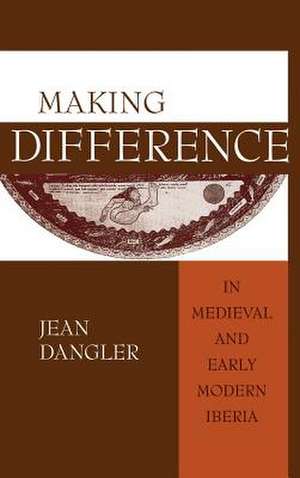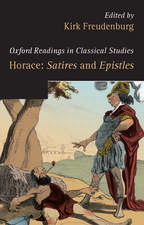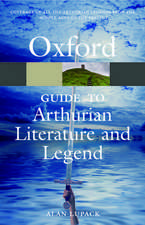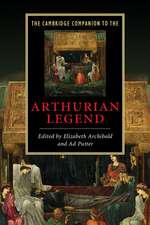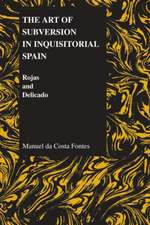Making Difference in Medieval and Early Modern Iberia
Autor Jean Dangleren Limba Engleză Hardback – 28 noi 2005
| Toate formatele și edițiile | Preț | Express |
|---|---|---|
| Paperback (1) | 278.46 lei 6-8 săpt. | |
| MR – University of Notre Dame Press – 28 noi 2005 | 278.46 lei 6-8 săpt. | |
| Hardback (1) | 591.49 lei 6-8 săpt. | |
| MR – University of Notre Dame Press – 28 noi 2005 | 591.49 lei 6-8 săpt. |
Preț: 591.49 lei
Preț vechi: 768.17 lei
-23% Nou
Puncte Express: 887
Preț estimativ în valută:
113.20€ • 117.74$ • 93.45£
113.20€ • 117.74$ • 93.45£
Carte tipărită la comandă
Livrare economică 15-29 aprilie
Preluare comenzi: 021 569.72.76
Specificații
ISBN-13: 9780268025755
ISBN-10: 0268025754
Pagini: 230
Dimensiuni: 159 x 235 x 20 mm
Greutate: 0.59 kg
Ediția:1
Editura: MR – University of Notre Dame Press
ISBN-10: 0268025754
Pagini: 230
Dimensiuni: 159 x 235 x 20 mm
Greutate: 0.59 kg
Ediția:1
Editura: MR – University of Notre Dame Press
Recenzii
“Dangler looks at the forces that define and control alterity in four sets of discourses: muwashsha/jarcha poetry of al-Andalus, lace-like Andalusi ‘cutting poems’ (cartas de Tijeras), medical treatises concerning the body, and representations of monsters. Relating the development of the medieval models to changing perceptions of the Otherness and to the cultural values that both inform and derive from them, the author argues that medieval society did not depend on the hierarchies and acts of denigration that came to characterize the early modern mindset…Highly recommended.” —Choice, May 2006
“Jean Dangler has attempted to enlighten the reader to a further understanding of medieval Iberia's 'Golden Age' of toleration and how that era evolved into one of intolerance . . . Dangler's elucidation and scholarship are unquestionable.” —The Historian, vol. 69, no. 3
“Jean Dangler… examines ways in which ideas of difference were forged in four types of Iberian discourse: jarchas poems from Al-Andalus, Andalusí cutting poems, medical literature about the body, and discourses about monsters… Her enthralling analysis of these four discourses examines early modern transformations that illustrate shifts in the perceptions of alterity and in prevailing cultural values.” —This Year’s Work in Modern Language Studies, 68, 2006, 2008
Notă biografică
Jean Dangler is associate professor of Spanish at Tulane University.
Descriere
"This is a book of great importance. Dangler’s judicious and complex arguments are exemplary and in many ways the best ever written in this fraught area." —Maria Rosa Menocal, Yale University
"Using an interesting and diverse assortment of texts—from the canonical to little studied 'cutting poems,' riddles, and medical texts—Dangler provides a fresh perspective on a medieval Iberia that sustained a fluid concept of identity and an acceptance of difference that extended even to the level of the deformed monstrous. Her insights enrich our understanding of the texts and of medieval culture." —Margaret R. Greer, Duke University
"Jean Dangler's book explores new ways to explain the problem of alterity in the medieval and early modern Iberian peninsula. By challenging our preconceived ideas, Dangler gives us a new set of important questions that will lead us to perceive in a different form this essential period: How can we understand alterity in multicultural societies? How can we deal with difference as a cultural category? And, when the construction of difference and alterity changes, how are these changes debated in the 'body' of culture? Her study is not only an extremely original piece of scholarship; it is also a way that can lead scholars to establish a dialogue that is, more than ever, a necessity." —Jesús D. Rodríguez-Velasco, University of California, Berkeley
Medieval Iberia was a multicultural territory of Muslim, Jewish, and Christian societies in constant geographic, cultural, political, and economic contact. In this engaging study, Jean Dangler examines the way that ideas of difference were forged in four types of medieval Iberian discourse: muwashshah/jarcha poems from al-Andalus, Andalusi "cutting poems," medical literature about the body, and portrayals of the monster. She argues that the texts demonstrate the two fundamental precepts of medieval Iberian alterity: multifaceted subject formation and the embrace of contrasts and the negative. Dangler explores how the four discourses she analyzes changed in the early modern period from an acceptance of difference to more rigid concepts of subjectivity and the marginalization of difference—a shift accompanying the rise of the Castilian nation-state and its imposition of static hierarchies of value.
